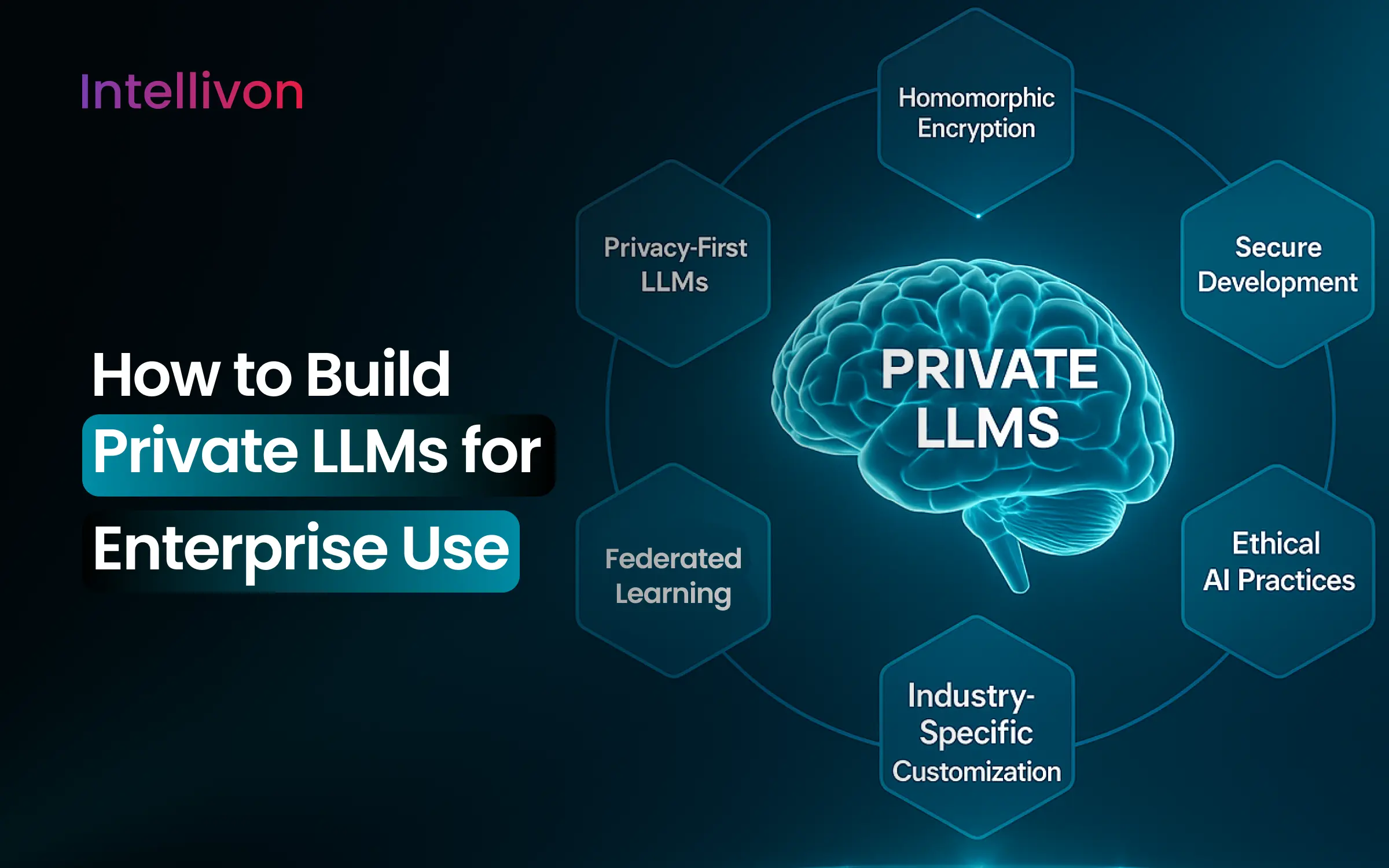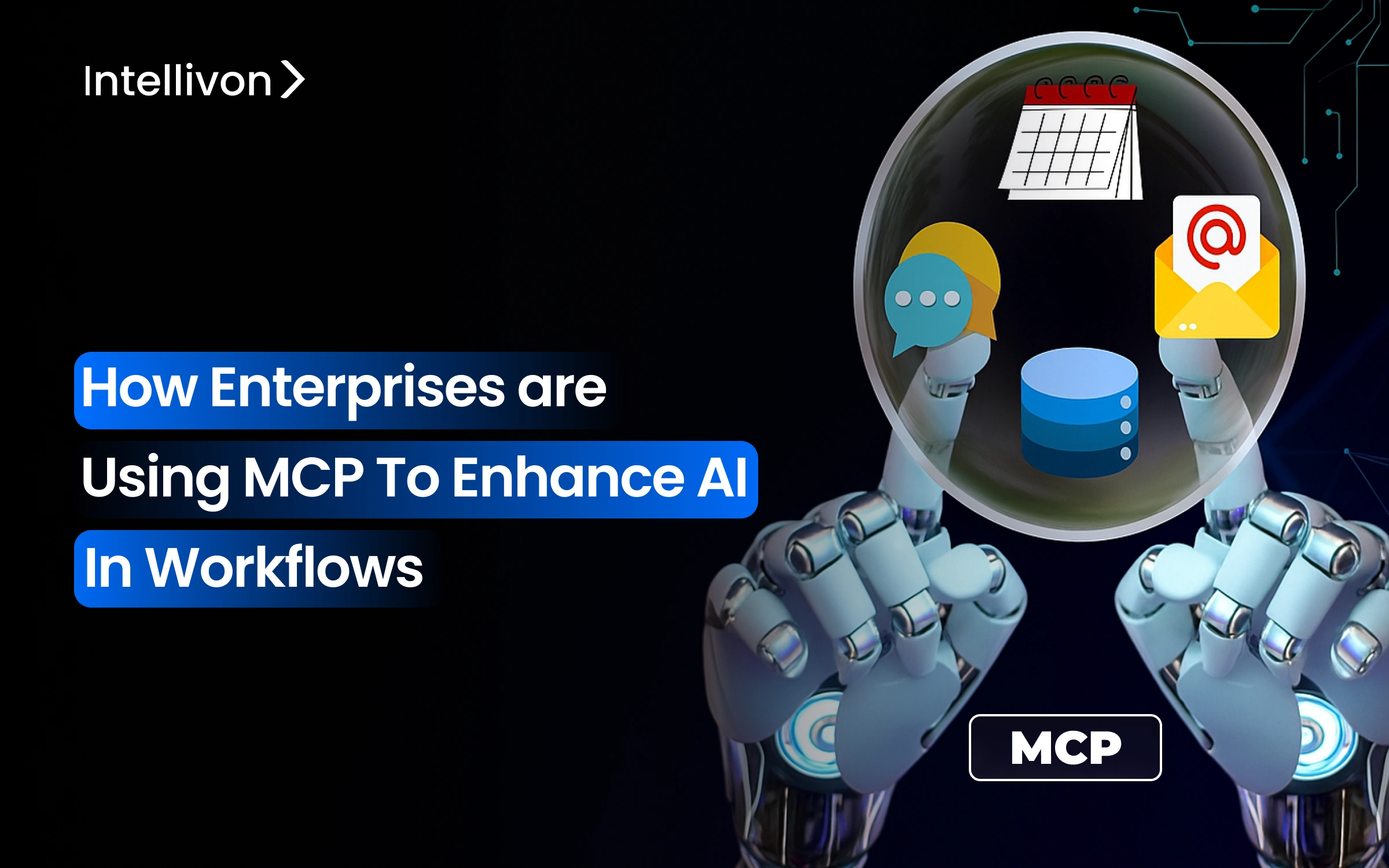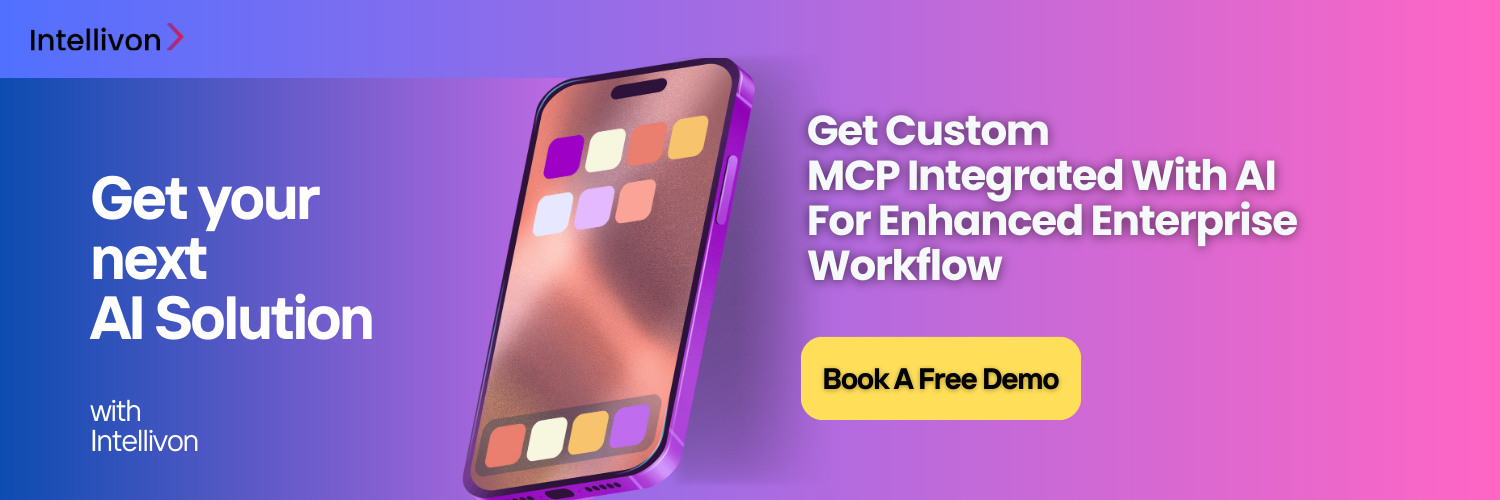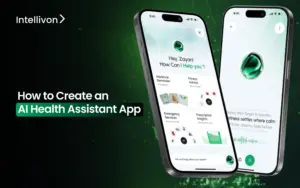Enterprise workflows have become more seamless and automated than ever before. In fact, over 78% of enterprises are now adopting AI to optimize their core business processes. However, a key bottleneck still persists: generating context-aware solutions in real time and connecting with external data sources and APIs across multiple channels. This is where Model Context Protocol (MCP) steps in as the missing link. MCP ensures AI models can operate with real-time context, enhancing decision-making and integrating diverse data streams seamlessly into enterprise workflows.
At Intellivon, we’ve helped leading enterprises build and deploy MCPs that turn AI from a disconnected novelty into a fully integrated enterprise workflow fuel. In this guide, you’ll learn exactly what an MCP is in the enterprise workflow context, why your AI needs one, and how we build and implement it step by step for enterprise AI.
Key Takeaways of the MCP Market
According to Fortune Business Insights, the Context-Aware Computing Market is projected to grow from USD 70.94 billion in 2025 to USD 122.20 billion by 2030, at a compound annual growth rate (CAGR) of 11.49%.
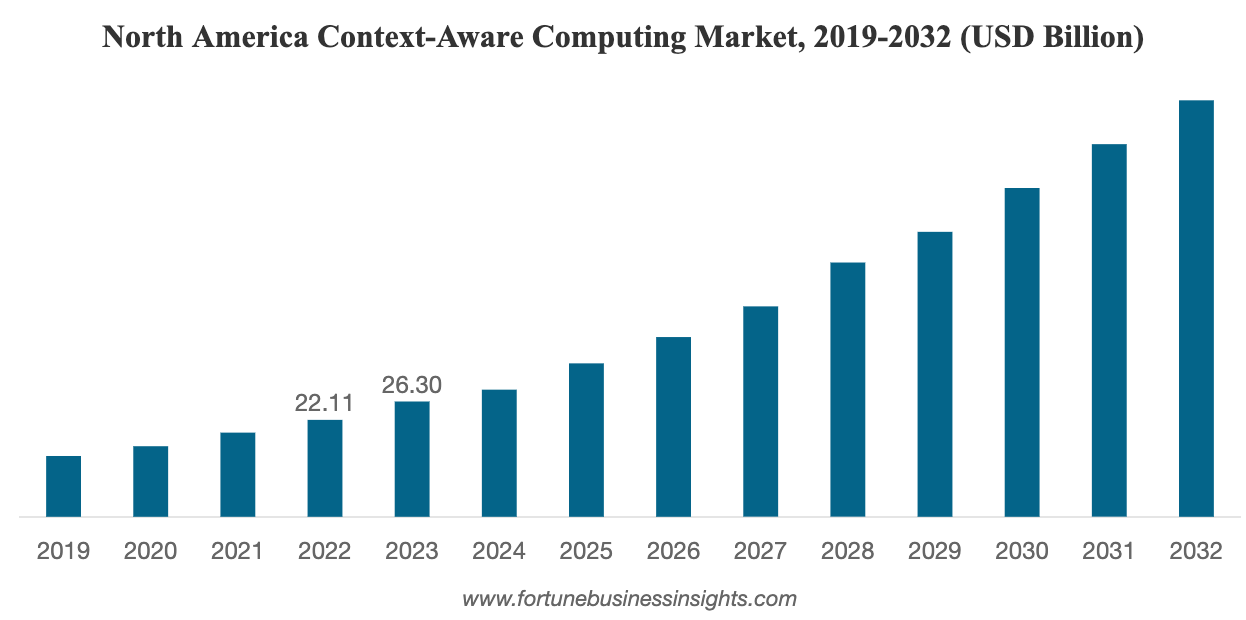
- Over 90% of organizations investing in AI are implementing or planning to implement MCP-enabled architectures, highlighting near-universal enterprise interest.
- Leading vendors like OpenAI, Microsoft, Anthropic, and SuperAGI are incorporating MCP standards into their products, validating its role in AI interoperability.
- MCP is especially beneficial for data-heavy, compliance-driven industries like healthcare and finance, with notable use cases in customer support, enterprise automation, and IoT.
Understanding Model Context Protocol (MCP) in Enterprise AI Workflow Context
In the context of enterprise AI, Model Context Protocol (MCP) is a framework that ensures AI models understand and process data within the right context. This means that instead of simply analyzing data in isolation, MCP helps AI models interpret information in relation to their surroundings, history, and intent. It aligns multiple AI models and systems, ensuring that each model operates within a consistent, real-time context across various business workflows.
For instance, if your enterprise is using AI to process customer service interactions, MCP ensures that the AI model can dynamically adjust its responses based on the customer’s history, preferences, and current context. This allows businesses to make more informed and context-aware decisions, improving customer satisfaction and operational efficiency.
Key Components of MCP
MCP is built around a few key components that work together to ensure smooth AI integration and real-time data processing. These components include:
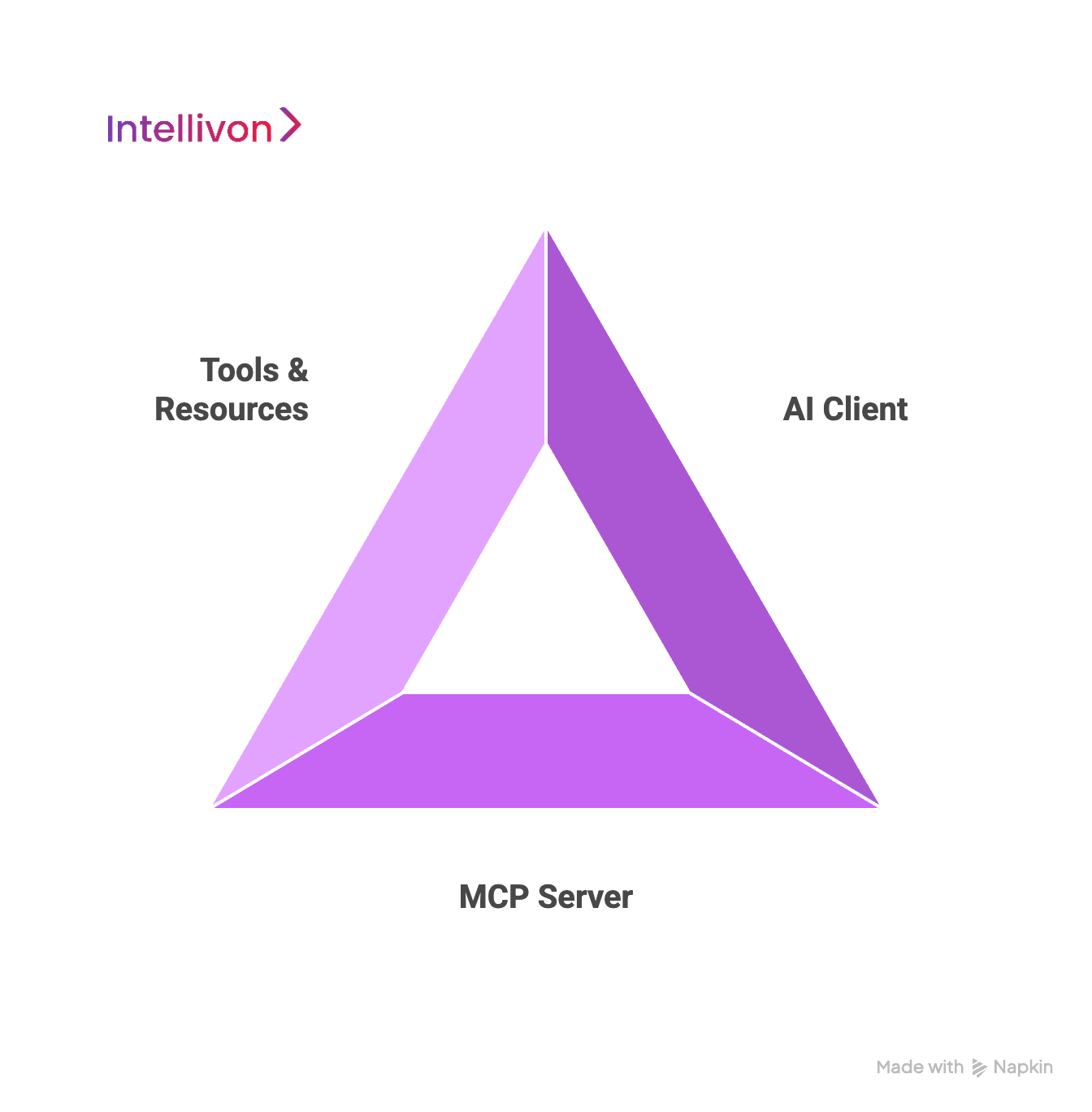
1. AI Client
This is your AI model or agent, like an LLM. It’s the brain behind the interaction, generating requests based on user input or tasks.
2. MCP Server
This is the translator and traffic controller. It listens to what the AI wants, understands the request, and sends it to the right tool in a format that the tool can process. It’s not an interface, but the bridge between thought and action.
3. Tools & Resources
These are your internal systems, like databases, APIs, spreadsheets, ERP, CRM, knowledge bases, and more. MCP allows your AI to safely interact with these tools in a controlled and secure way.
For example, a retail business using AI to recommend products will need to consider context like past purchase history, browsing behavior, and current stock levels. MCP helps the AI model adapt and generate personalized recommendations that are contextually relevant, improving the customer’s shopping experience.
How It Works in Enhancing Enterprise AI
MCP works by enabling AI models to work with the same level of understanding across various business functions. Think of it as providing “context awareness” to AI systems, allowing them to process information with greater relevance and precision.
In a practical sense, this means that instead of a simple data input and output, AI models in an enterprise workflow can dynamically adjust their actions and predictions based on real-time context. For example, in a financial services company, MCP helps AI detect fraud by cross-referencing customer transaction data with historical patterns, risk levels, and external threat intelligence feeds. This helps flag potentially fraudulent activity faster and more accurately.
Moreover, by connecting to external data sources and APIs, MCP can bridge the gap between different systems within the enterprise, making the entire workflow more cohesive.
In short, MCP enhances enterprise AI by ensuring consistency, agility, and real-time decision-making across workflows, helping businesses stay competitive and responsive to ever-changing environments.
Overcoming Common Enterprise AI Challenges with MCP
Enterprises looking to integrate AI into their workflows often face significant hurdles. These challenges involve issues around data access, security, and scalability. MCP provides a standardized and secure framework that addresses these concerns head-on, allowing companies to move from pilot projects to full-scale, value-generating AI workflows. It ensures that AI is not a standalone, siloed tool, but a deeply integrated and reliable part of business operations.
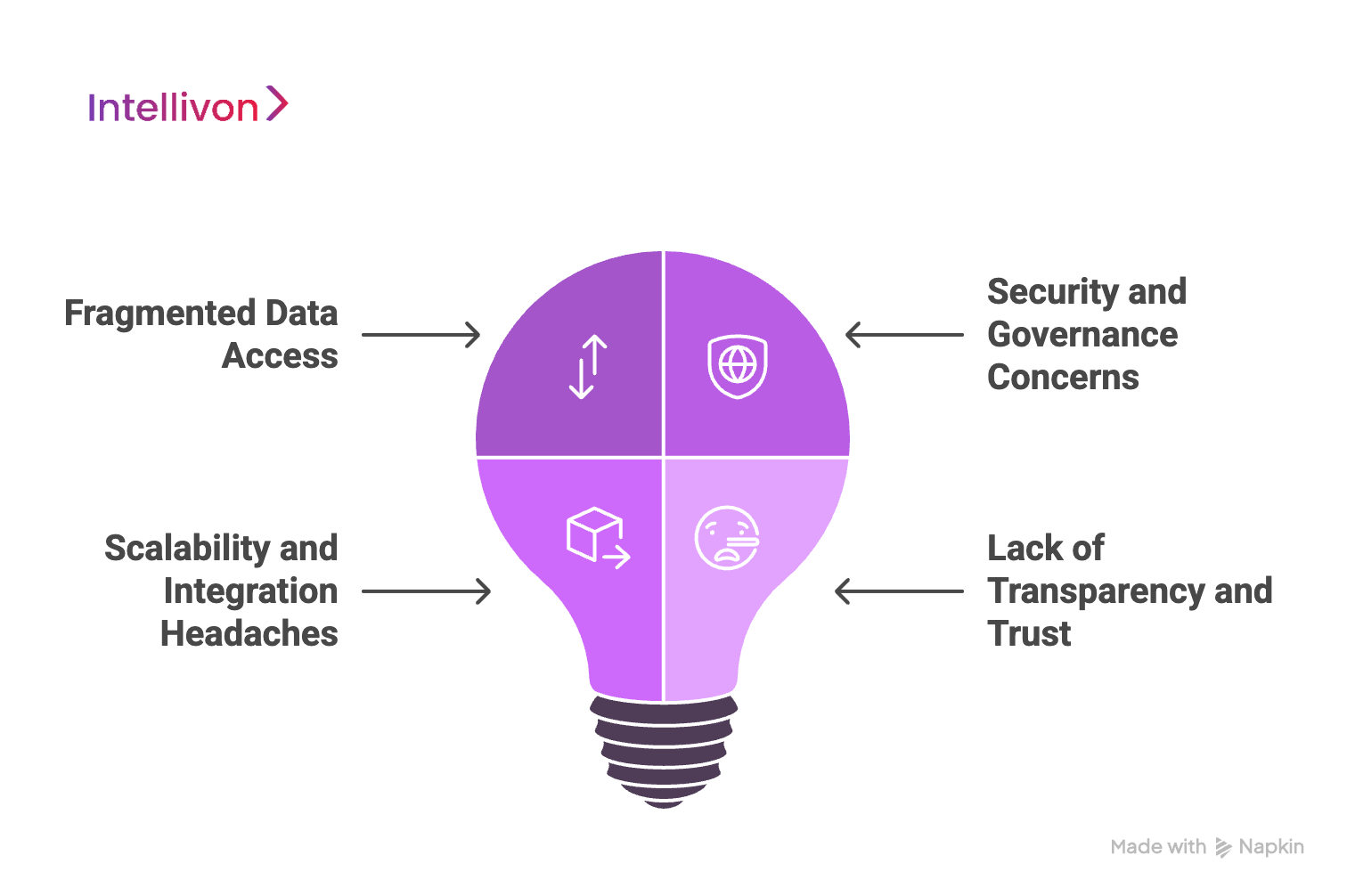
1. Fragmented Data Access
One of the most pressing challenges for enterprises is dealing with data scattered across multiple systems, whether it’s CRM platforms, ERPs, legacy databases, or cloud services. This fragmentation prevents businesses from having a single source of truth, which is crucial for reliable and actionable AI insights.
MCP solves this issue by acting as a universal translator. It standardizes how AI models connect to and retrieve data from any source, regardless of its format or location. This creates a “unified data brain” for AI, ensuring that it always operates with the most complete and accurate context.
2. Security and Governance Concerns
When AI systems access sensitive data, security and governance become critical. Enterprises worry about data breaches, unauthorized access, and compliance with regulations like GDPR and HIPAA. Traditional point-to-point integrations for AI tools create security risks and make it difficult to track and audit data usage, hindering AI adoption at scale.
MCP addresses these concerns by incorporating security and access controls directly into its framework. Every interaction between an AI model and a data source is logged, providing an auditable trail of data requests. This transparency helps businesses ensure compliance with regulations and offers granular permission controls, making it possible to limit AI access to only authorized data, reducing the risk of unauthorized exposure.
3. Scalability and Integration Headaches
Scaling AI from pilot projects to full enterprise deployment can be a challenge. Each new AI tool or data source often requires custom integration, leading to complex, hard-to-maintain code. As the enterprise grows, this “glue code” can slow development, increase costs, and make AI systems difficult to update or scale.
MCP eliminates this issue with its plug-and-play architecture. Once a data source is integrated into MCP, it becomes available to any AI model that supports the protocol. This modular design allows businesses to rapidly scale their AI initiatives with minimal engineering effort, reducing the complexity of integrating new tools or technologies as they emerge.
4. Lack of Transparency and Trust
AI’s “black box” nature is often a barrier for enterprises. Business leaders find it difficult to trust AI when they can’t understand or explain how it arrives at a decision. This lack of transparency is particularly concerning in critical workflows like financial analysis, medical diagnostics, and legal reviews, where clear explanations of AI decisions are essential.
MCP provides structured contextualization and logging, allowing businesses to trace AI decisions back to their source data. This clear lineage enables transparency, helping organizations understand how conclusions are drawn. As a result, MCP transforms AI from a mysterious black box into a transparent, trustworthy system that can be audited and explained, increasing confidence and accelerating broader adoption.
By addressing these key challenges, MCP provides enterprises with the reliable, secure, and efficient infrastructure they need to integrate AI into their workflows fully.
Key Benefits of Integrating MCP into AI for Enterprise Workflows
By providing a standardized, secure, and scalable framework, MCP elevates AI from a siloed tool into a core component of your business’s operational ecosystem. Here are the high-impact benefits that come with adopting MCP for your enterprise AI workflows:
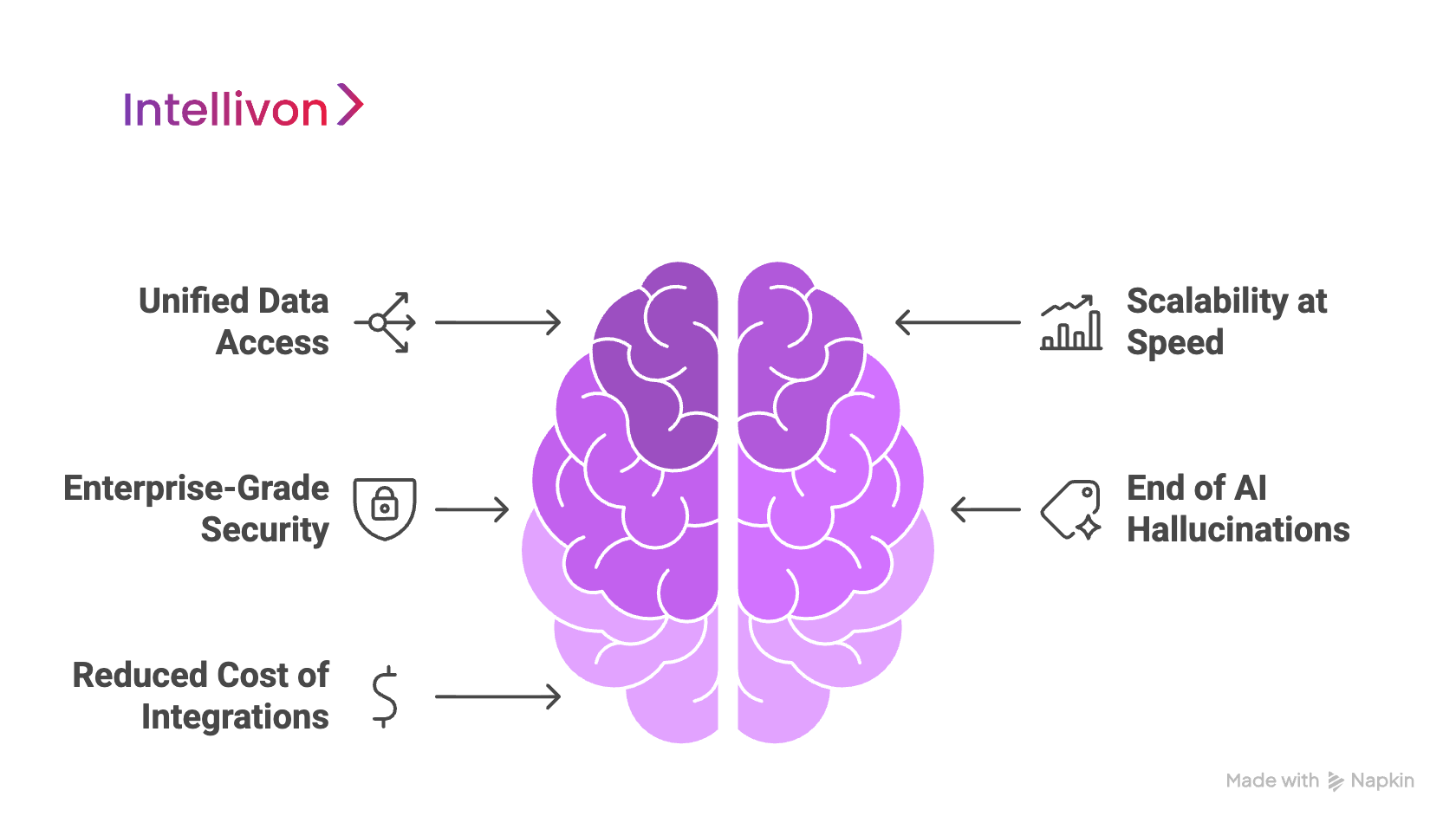
1. Unified Data Access
Enterprise data is often scattered across various systems, like CRMs, ERPs, databases, and legacy platforms. This fragmentation is a significant barrier that prevents AI models from offering complete, intelligent responses. Without a unified view of the data, AI struggles to generate accurate and relevant insights.
MCP solves this issue by acting as a universal translator. It creates a single, secure gateway for all your data, enabling AI models to access and synthesize information from any connected source seamlessly. Instead of building custom integrations for each new AI application, MCP allows you to unify your data sources and provide a holistic view of your business.
This unified access empowers your AI to generate context-aware insights that would have been previously impossible, ensuring that all decisions are based on the most complete and up-to-date data.
2. Scalability at Speed
Scaling AI from a small pilot project to a full-scale enterprise solution is a significant challenge. Traditional AI systems require individual integration for each new tool or data source, leading to complex IT architectures that can be fragile and costly to maintain.
MCP removes this complexity with its modular, plug-and-play design. By standardizing communication between AI models and data sources, MCP enables a system to be integrated once and made available to any AI application that supports the protocol. This dramatically reduces development time and costs, allowing you to scale AI solutions rapidly and without fear of system breakdowns.
As your business grows and new AI tools emerge, MCP ensures that your AI infrastructure can grow with it, making it easy to deploy new solutions and improve existing workflows.
3. Enterprise-Grade Security
Security and compliance are top priorities for any enterprise, especially when dealing with sensitive data. Traditional AI integrations often create security risks by exposing data to unauthorized access and lacking transparency in auditing.
MCP provides robust security with a built-in access control layer. Every interaction between an AI model and a data source is mediated and logged, ensuring that AI models only access the specific data they are authorized to use. This creates a clear, auditable history of every decision and data access, providing full transparency into the AI’s actions.
For industries with strict compliance regulations, such as finance and healthcare, this level of governance is critical for maintaining trust and ensuring that your AI models are aligned with the highest standards of security and compliance.
4. End of “AI Hallucinations”
One of the biggest challenges enterprises face when using Large Language Models (LLMs) is the phenomenon of “hallucinations”, where AI generates plausible-sounding but factually incorrect information. This occurs when AI models operate with outdated or incomplete knowledge.
MCP combats this issue by providing real-time, verifiable context. By directly connecting the AI models to live data sources, MCP ensures that AI always has access to the most accurate and up-to-date information. This significantly reduces the likelihood of “hallucinations,” enabling AI to generate responses that are grounded in the company’s single source of truth.
As a result, you can rely on AI to provide more trustworthy and accurate insights, which is essential when using AI in critical decision-making processes.
5. Reduced Cost of Integrations
Maintaining custom integrations for fragmented AI systems is expensive and time-consuming. Enterprises often find themselves spending considerable resources on bespoke “glue code” to connect disparate systems, leading to inefficiency and high operational costs.
MCP streamlines this process by eliminating the need for custom integrations. With MCP, you don’t have to spend time and money on maintaining brittle infrastructure. Instead, you can focus your development efforts on building valuable AI applications that directly benefit your business. By enabling more efficient, context-aware workflows, MCP allows you to improve operational processes, from automating customer service to optimizing supply chain management.
These efficiencies lead to tangible cost savings and deliver a measurable return on your AI investments.
Use Cases of MCP-Driven AI in Enterprise Workflows
MCP is revolutionizing how AI integrates into enterprise workflows across a wide range of sectors. By enabling enterprises to connect their AI models with internal systems, data, and APIs, MCP ensures a seamless flow of information, improving operational efficiency, decision-making, and overall productivity. Below are several real-world use cases of MCP, demonstrating how it is transforming enterprise functions.
1. Big Data Analytics and BI Automation
MCP allows AI to access and analyze vast, siloed datasets from various sources in real-time. In many enterprises, data is spread across different systems, making it difficult for AI models to gather all the relevant information in one place. With MCP, AI models can query multiple sources, such as databases, cloud systems, and APIs, simultaneously, offering more comprehensive insights without needing manual intervention.
For example, a data analyst could ask an AI agent, “Show me the top-performing products by region for Q3 and correlate that with our recent marketing spend data.” Using MCP, the AI agent can seamlessly pull data from sales, marketing, and customer relationship management systems, automatically compiling a real-time, comprehensive report.
Real-World Example:
Domino’s Pizza uses MCP to enable its AI systems to pull data from its sales database, CRM, and external marketing platforms to create real-time reports on product performance and marketing effectiveness. With this integration, the company can analyze performance data, customer trends, and marketing return on investment in real time, enabling quick adjustments to business strategies.
2. Unified Customer 360 View
MCP provides the ability to link front-end CRM systems with back-end ERP systems, creating a comprehensive, unified view of the customer. Often, enterprises struggle to maintain a single view of the customer, as the information is scattered across multiple systems. With MCP, AI models can pull data from different systems, such as CRM systems for customer interactions and ERP systems for purchase history, to provide a 360-degree view of each customer.
This allows customer service representatives, sales teams, or marketing professionals to instantly get a full picture of the customer’s needs and pain points.
Real-World Example:
Microsoft Dynamics 365 integrates MCP to connect CRM and ERP data. This enables businesses to create a unified view of the customer, combining sales, service, and support data into one accessible platform.
3. Enterprise Knowledge Management
MCP is transforming static knowledge bases into dynamic, conversational assets. Traditional knowledge management systems often house large amounts of static information, such as internal documents, wikis, and manuals, but retrieving relevant information can be time-consuming. With MCP, AI assistants can now search through these vast repositories and understand the context of an employee’s query, providing relevant, up-to-date information.
MCP enhances the AI’s ability to respond with greater accuracy by understanding the specific context of each query. Instead of just returning random pieces of information, the AI can process the query intelligently, providing the most relevant information based on the employee’s immediate needs.
Real-World Example:
IBM leverages MCP within its Watson AI platform to enable dynamic knowledge management. By using MCP, Watson can search IBM’s internal systems and databases, offering employees immediate access to relevant information across various sources like legacy ERP systems and wikis. This has reduced the time employees spend searching for information by 50%, allowing them to focus more on productive tasks and improving overall company efficiency.
4. Automated IT Service Management
AI-driven automation is revolutionizing IT service management by handling routine tasks autonomously. With MCP, AI models can access multiple IT systems simultaneously, resolving issues without the need for human intervention. For example, when an employee submits an IT support request, the AI agent can identify the problem, access the identity management system to reset passwords, or even escalate the issue to the appropriate IT team member.
This automation reduces resolution time, frees up IT staff to work on more complex issues, and improves overall IT support efficiency.
Real-World Example:
ServiceNow, a leading IT service management platform, has integrated MCP to automate IT service requests. When a user submits a ticket for a locked account, the AI agent, powered by MCP, accesses the company’s identity management system to reset the password. This solution has significantly decreased resolution time for routine IT tasks and allowed IT staff to focus on more complex issues, enhancing overall department efficiency.
5. Finance Operations Automation
In finance operations, MCP allows AI agents to access and interact with multiple financial systems, streamlining processes such as invoice processing, loan underwriting, and purchase order management. Often, these financial systems operate in silos, requiring manual data entry and verification, which can be time-consuming and prone to human error.
With MCP, AI models can automatically retrieve data from systems like SAP, Coupa, or SAP Concur, and integrate it into seamless workflows that require no human intervention. This automation leads to faster processing times, greater accuracy, and improved compliance.
Real-World Example:
Siemens uses MCP to automate its finance operations. The company integrates multiple financial systems, including SAP and Coupa, with MCP, enabling AI to automate tasks such as invoice processing, purchase order verification, and approval workflows. This integration has saved time, reduced manual errors, and ensured a more efficient and compliant financial process.
6. Healthcare Patient Data Coordination
In the healthcare sector, MCP enables AI to unify patient data from disparate sources, such as Electronic Health Records (EHRs), lab results, and wearable devices. By bringing together this data, AI systems provide clinicians with a comprehensive, real-time overview of a patient’s health, leading to faster, more accurate diagnoses and treatment plans.
MCP ensures that data is seamlessly transferred between systems, enabling AI models to deliver more informed insights without the need for manual data entry or intervention.
Real-World Example:
Mount Sinai Health System in New York has adopted MCP to unify patient data from multiple sources, including EHRs, lab results, and wearable devices. The AI-powered system gives clinicians a real-time, consolidated view of each patient’s medical history. This integration has improved diagnostic turnaround times by 20%, enabling quicker and more accurate decision-making.
7. Supply Chain Optimization and Logistics
MCP aids businesses in optimizing their supply chains by allowing AI models to continuously monitor real-time data from logistics systems, sensors, and production schedules. These insights help companies predict potential delays, optimize routing, and proactively adjust shipments to avoid bottlenecks.
By integrating data across multiple systems, MCP enables AI agents to make real-time adjustments that optimize supply chain operations, reducing costs and improving overall efficiency.
Real-World Example:
BMW has implemented MCP to enhance its supply chain and logistics operations. The company uses MCP to connect AI agents with data from production systems and logistics platforms, enabling predictive maintenance and proactive shipment rerouting. This has led to a significant reduction in unexpected downtime and maintenance costs, improving both operational efficiency and customer satisfaction.
8. Omnichannel Marketing Campaigns
MCP enables AI to orchestrate and unify content across various platforms, ensuring consistency across multiple channels. Marketing teams can create content once, and the AI can push it to various platforms, including content management systems (CMS), social media, and email campaigns, all while ensuring that the message remains consistent.
This integration helps businesses scale their marketing efforts without losing control over brand consistency.
Real-World Example:
Coca-Cola uses MCP to streamline its omnichannel marketing campaigns. The company’s AI-powered system integrates with their CMS and social media platforms, automating the process of content creation and distribution across all channels. This enables Coca-Cola to rapidly deploy content while maintaining consistent branding and messaging across the company’s global marketing campaigns.
9. AI Conversational Agents for Workflow
MCP enhances conversational AI by allowing agents to execute complex, multi-step workflows. For example, a customer could inquire about their order status, and the agent could not only respond with the status but also process a refund by interacting with the e-commerce platform and payment gateway.
This capability makes conversational AI more functional, providing a streamlined experience for both customers and businesses.
Real-World Example:
L’Oréal uses MCP to power its AI-driven customer service platform. Customers can interact with the AI to check their order status, request a refund, and complete the entire process through a single chat interface. By automating these processes, L’Oréal has improved customer satisfaction and reduced service response times.
10. Regulatory Compliance and Risk Monitoring
In regulated industries, MCP provides a secure, auditable framework for AI systems to continuously monitor transactions and flag anomalies in real-time. For example, AI agents can ensure compliance with regulations like SOX, Basel III, or GDPR by monitoring transactions and analyzing patterns to identify potential violations.
This continuous monitoring enables businesses to stay compliant without manual oversight and reduces the risk of regulatory penalties.
Real-World Example:
HSBC, a global financial institution, uses MCP to enhance its regulatory compliance and risk monitoring systems. By integrating MCP with its transaction systems, HSBC can monitor real-time financial transactions, flagging potential non-compliant activities for investigation. This system has reduced analysis time by 50%, allowing the bank to maintain compliance with international financial regulations more efficiently.
Industry-Wise MCP Use Cases in Enterprise Workflows
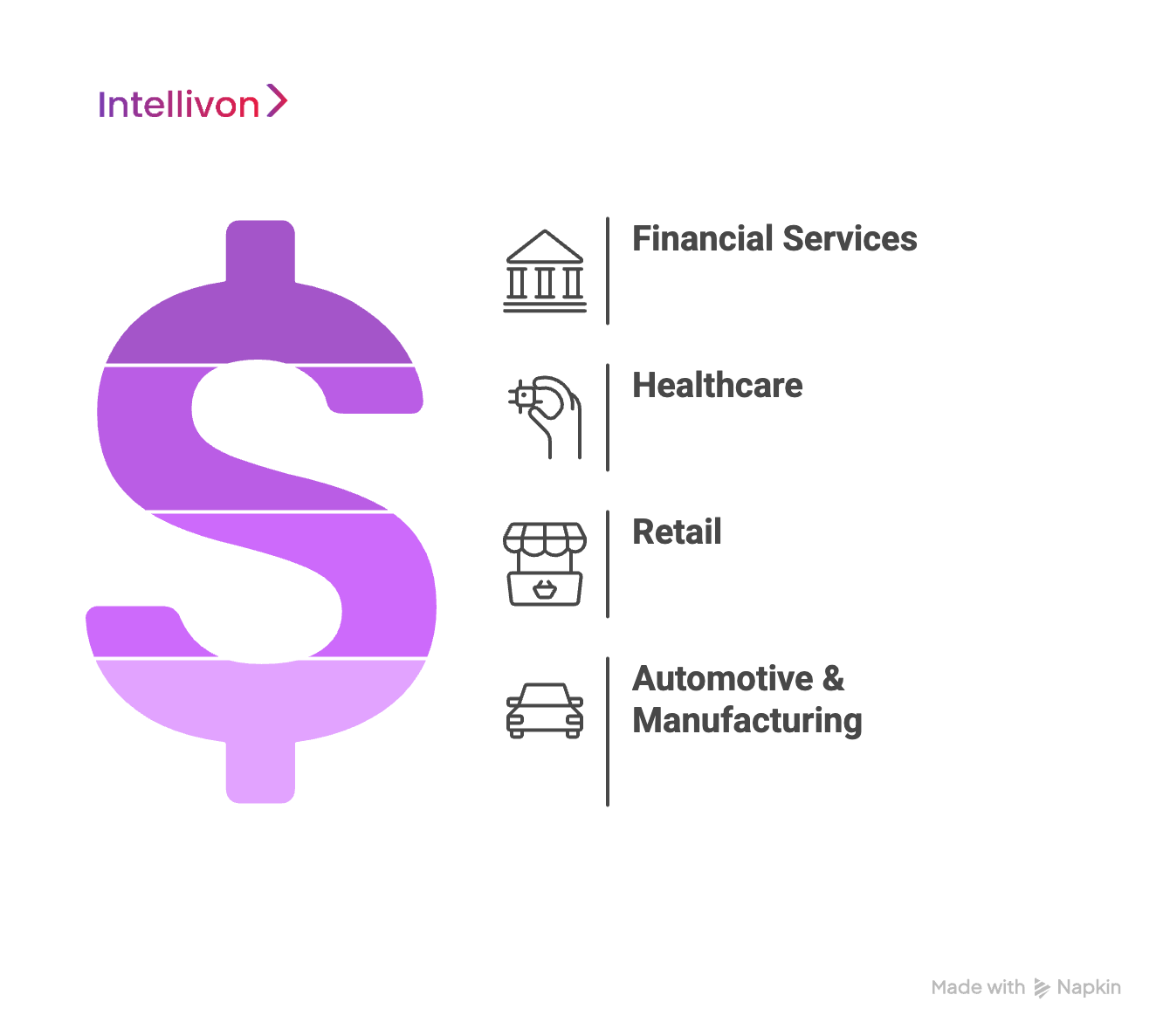
Financial Services
1. Risk Assessment and Fraud Detection
Financial institutions leverage MCP to perform continuous, real-time audits of transaction data. AI agents can flag suspicious transactions by analyzing patterns and deviations from normal behavior. For example, a financial institution integrated MCP into its core banking systems to instantly identify and block potentially fraudulent transactions.
2. Finance Operations Automation
MCP also simplifies back-office financial processes. AI agents can autonomously handle tasks like loan underwriting, accessing data from credit bureaus, and analyzing customer financial records, ensuring both speed and compliance.
Healthcare
1. Clinical Decision Support
AI agents powered by MCP assist clinicians by providing real-time, context-aware information. By pulling together patient data from various sources, including medical histories and real-time vital signs, AI can recommend the most appropriate treatment plans.
2. Patient Data Coordination
MCP helps unify patient data across different sources, providing a comprehensive view for clinicians. For example, AI can integrate genetic data with medical history to recommend personalized treatment plans in oncology.
Retail
1. Personalized Customer Engagement
MCP allows AI to create highly personalized shopping experiences. AI-powered chatbots can access a customer’s purchase history and browsing behavior to offer tailored recommendations and promotions.
2. Inventory and Demand Forecasting
Using MCP, AI can connect with point-of-sale systems and warehouse management software to predict demand and adjust inventory in real time.
Automotive & Manufacturing
1. Predictive Maintenance
Manufacturers use MCP to predict when machinery will need maintenance by analyzing real-time data from sensors. This proactive maintenance helps avoid costly downtime.
2. Supply Chain Optimization
MCP aids in managing complex global supply chains by allowing AI agents to track inventory, shipments, and production schedules in real time, ensuring smooth operations and cost optimization.
MCP is proving to be a game-changer in enterprise AI workflows. By enhancing efficiency, improving decision-making, and enabling seamless integration, it is helping businesses across various industries transform their operations.
How We Implement MCP in Your AI for Enterprise Workflows: A Step-by-Step Guide
At Intellivon, we specialize in seamlessly integrating MCP into enterprise AI workflows, transforming how your business interacts with data and AI models. By following a structured, nine-step approach, we ensure that your enterprise’s AI systems are optimized, efficient, and scalable. Here’s how we implement MCP for your enterprise:
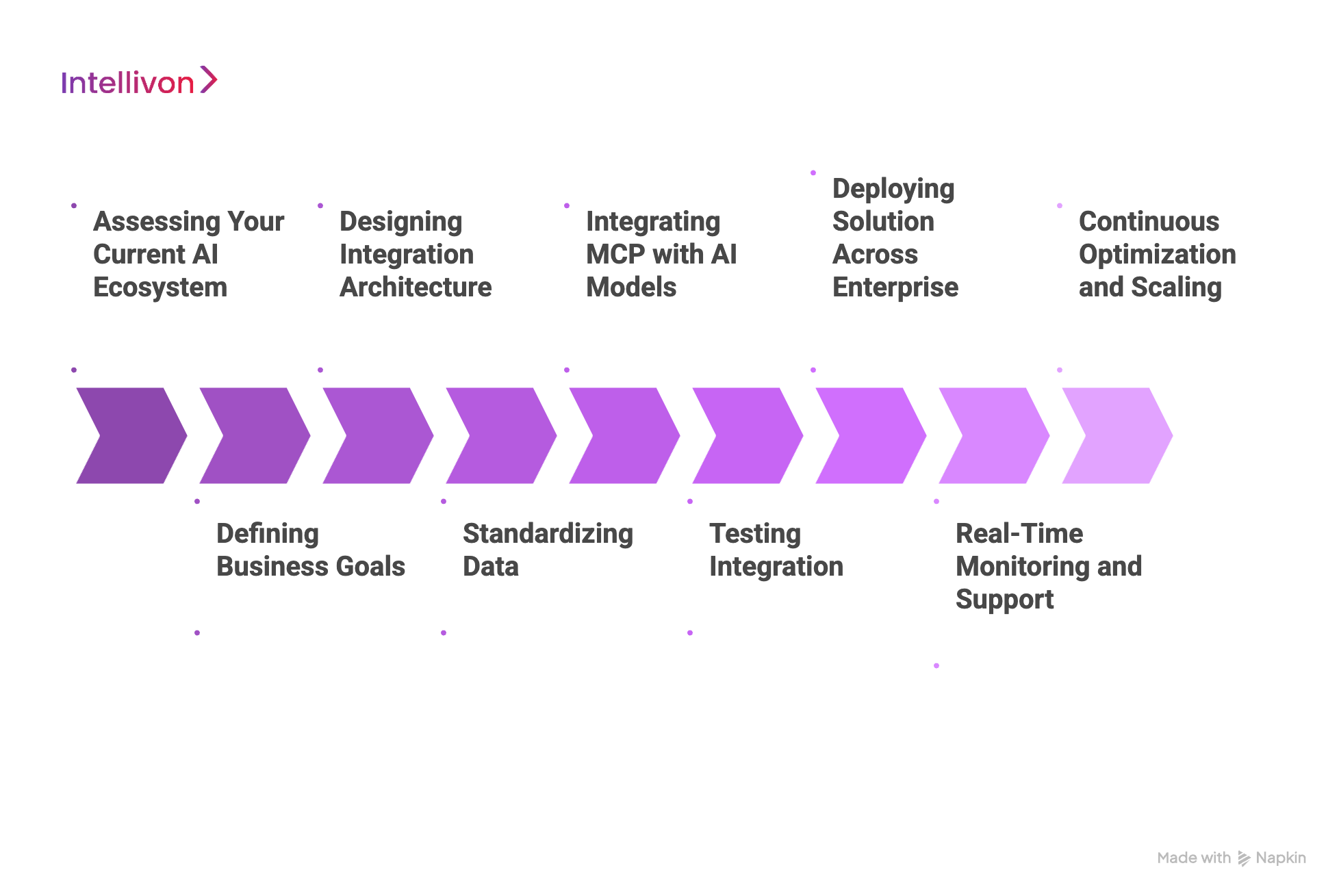
Step 1: Assessing Your Current AI Ecosystem
We begin by conducting a thorough assessment of your existing AI systems, data flows, and business workflows. This includes mapping out how data is currently shared between different platforms, identifying siloed systems or inefficiencies, and recognizing the critical dependencies for successful MCP integration. We also identify areas where real-time data access could significantly enhance decision-making and performance.
Step 2: Defining Business Goals
We work closely with your team to understand your specific business objectives—whether that’s improving operational efficiency, enhancing real-time data access, or automating workflows. By clearly defining these objectives, we tailor the MCP implementation to meet your strategic goals. We also establish performance metrics to measure the success of the integration, ensuring alignment with your overall business strategy.
Step 3: Designing Integration Architecture
We design a customized integration architecture that connects MCP with your AI models, data sources, and APIs. Our design focuses on ensuring smooth data flow, with scalable integration options using API connectors, middleware solutions, and secure data transfer methods. We plan for scalability and flexibility, ensuring the architecture can evolve with your business needs and emerging technologies.
Step 4: Standardizing Data
We ensure that your data is clean, standardized, and secure for use in AI models. Our team conducts a data quality assessment, cleaning, and standardizing datasets across your enterprise. Additionally, we implement strong security protocols and compliance measures to adhere to industry standards like GDPR, HIPAA, or others, ensuring your data is handled safely and efficiently.
Step 5: Integrating MCP with AI Models
We integrate MCP with your AI models, enabling them to access a variety of real-time data sources. This enhances their ability to make context-aware decisions. We also fine-tune the AI models to ensure they are fully optimized for these new data flows, ensuring accuracy and efficiency in decision-making.
Step 6: Testing Integration
We perform comprehensive testing of the MCP integration, including stress tests, edge case testing, and performance evaluations under different conditions. We verify that the AI models are receiving the correct data and delivering accurate, context-aware insights. Additionally, we check for system compatibility and performance when handling large datasets and high volumes of concurrent requests.
Step 7: Deploying Solution Across Enterprise
Once testing is complete, we deploy the MCP-powered solution across your entire organization, ensuring that all relevant departments and systems are integrated into the new workflow. Our deployment process is structured to minimize downtime and disruption. We provide training sessions and change management support to ensure your team is fully equipped to utilize the new system.
Step 8: Real-Time Monitoring and Support
After deployment, we continuously monitor the system’s performance in real time. This includes tracking AI interactions with data, ensuring accuracy and efficiency in decision-making. We also set up data quality monitoring to ensure that the models are always working with accurate, up-to-date data. Our team provides continuous support, making any necessary adjustments based on real-time feedback.
Step 9: Continuous Optimization and Scaling
The final step is continuous optimization and scaling. As your business grows, your AI systems will need to evolve. We work with you to scale the MCP integration, adding new data sources, tools, and systems to meet new challenges. We also regularly assess system performance, retrain models, and provide updates to ensure the integration continues to deliver value in the long term.
This approach ensures that your MCP integration is not just effective but also future-proof, allowing your enterprise AI systems to continuously evolve and improve over time. At Intellivon, we follow a detailed, nine-step process to seamlessly integrate MCP into your enterprise AI workflows, ensuring that your AI systems perform efficiently, securely, and at scale.. Ready to transform your AI workflows with MCP? Contact our experts today to get started on your journey.
How MCPs Enhance Your Existing Enterprise API Infrastructure
Your enterprise’s APIs are valuable, but they weren’t designed with AI in mind. MCPs don’t replace these APIs; instead, they enhance and empower them, acting as an intelligent layer that makes your legacy infrastructure AI-native.
1. From Rigid to Flexible
Traditional APIs are rigid and specific. Each API requires exact configurations for endpoints, data formats, and authentication. This makes scaling difficult and increases complexity. MCP acts as a universal translator, abstracting this complexity. It wraps your APIs and presents them to AI as a standardized set of “tools.” With MCP, your AI doesn’t need to learn each API’s unique language, simplifying integration and reducing technical debt.
2. From Static to Dynamic
Traditional APIs are static and require hardcoding for AI models to access their functionality. In contrast, MCP enables dynamic discovery. When an AI model asks an MCP-enabled server, “What data and tools are available?” it gets a machine-readable list of functions in real time. This allows AI to adapt to new services and tools without manual updates, making your infrastructure more flexible and agile.
3. From Disconnected to Context-Aware
Traditional APIs lack context. An AI model might call separate APIs (e.g., CRM and ERP) without connecting the data. MCP solves this by providing contextualization. When a user asks a chatbot to “refund the last purchase,” MCP pulls the user’s ID and passes it to the ERP API call. This links separate requests into a single, intelligent workflow, giving your AI a more complete and accurate understanding of the situation.
MCPs supercharge your existing API infrastructure by enabling dynamic, context-aware, and flexible AI-driven workflows, transforming your legacy systems into intelligent, adaptable solutions.
How Enterprises Use MCP for RAG (Retrieval Augmented Generation) in LLM Context
RAG is a powerful method that enables large language models (LLMs) to access up-to-date, proprietary data to ground their knowledge in a company’s unique information. However, traditional RAG has limitations, especially in complex enterprise environments. This is where MCP comes in, enhancing RAG by providing a secure, scalable, and structured framework for retrieval, transforming a basic data lookup into a powerful, context-aware workflow.
1. Strategic Retrieval
Traditional RAG is static and reactive. It typically fetches a single document from a vector database to answer simple queries. However, it struggles with complex, multi-step tasks. MCP enhances RAG by enabling the LLM to use an MCP-powered RAG tool for intelligent, multi-source retrieval. This tool can perform advanced searches across multiple data sources, filtering results based on permissions, ensuring that the information retrieved is relevant, accurate, and secure.
2. Combating Hallucinations
While RAG grounds LLM responses in factual data, traditional RAG systems can still lead to irrelevant or contradictory results. MCP solves this by structuring the context, ensuring that the LLM retrieves data in structured formats, like JSON, rather than unstructured text. This clear, structured data serves as a consistent source of truth, dramatically reducing hallucinations and improving the accuracy of AI-generated responses.
3. Enabling Multi-Step, Agentic Workflows
MCP enables LLMs to perform complex, multi-step workflows, turning simple retrieval into orchestrated tasks. For example, when a request is made to “Create a summary of the Q3 earnings report and email it to the finance team,” the LLM uses MCP-powered RAG tools to first retrieve the report and then access an email tool to draft and send the summary.
4. Hybrid Retrieval
Enterprises often need both static (e.g., policy manuals, knowledge bases) and dynamic (e.g., live inventory or customer order status) data. Traditional RAG is effective for static documents but struggles with real-time data. MCP and RAG together create a hybrid model: RAG retrieves static data, while MCP fetches real-time, structured data from APIs or databases. The LLM receives both sources of information in a unified context, leading to more accurate and complete responses.
5. Enhanced Security
Traditional RAG systems often operate as “black boxes,” making it difficult to trace what data was accessed and how. MCP addresses this by providing an auditable gateway between the LLM and the data source.
Every retrieval request and response is logged, creating a clear, traceable record of what data was accessed, by which model, and for what purpose. This ensures compliance and security, especially for enterprises in highly regulated industries.
By leveraging MCP in RAG systems, enterprises can transform their AI workflows, ensuring that their LLMs operate with accuracy, security, and scalability. Whether you’re managing complex data retrieval or enhancing real-time workflows, MCP brings the structure and context necessary to elevate the power of RAG in your enterprise.
Conclusion
MCP is transforming the way AI integrates into enterprise workflows. By enabling seamless data flow, contextual understanding, and real-time decision-making, MCP supercharges AI systems, making them more autonomous, agile, and efficient.
It allows enterprises to optimize operations, enhance customer experiences, and drive sustainability, all while ensuring security and scalability. As AI continues to evolve, MCP will be the backbone of smart, interconnected business ecosystems, unlocking new levels of operational efficiency and personalization. To fully leverage the potential of MCP and ensure smooth integration into your business, partnering with an experienced solution provider can help you navigate the complexities and maximize its benefits.
Unlock the Full Potential of MCP in Your Enterprise Workflows with Intellivon
The future of AI in enterprise workflows is here, and Model Context Protocol (MCP) is key to unlocking seamless, scalable, and intelligent systems. At Intellivon, we specialize in integrating MCP into your existing infrastructure, enabling data-driven decision-making, enhanced automation, and efficient cross-departmental collaboration.
Why Choose Intellivon for MCP Integration?
- Tailored Solutions: We design custom MCP integrations based on your enterprise needs and industry requirements.
- Seamless Integration: Our team ensures smooth, end-to-end integration, bridging your legacy systems with advanced AI capabilities.
- Scalable and Future-Ready: We help you scale your AI workflows as your business grows, ensuring long-term adaptability and success.
Let’s Get Started:
Our AI experts are ready to assist you with:
- Conducting an in-depth analysis of your current AI ecosystem.
- Designing and integrating a tailored MCP-powered solution for your business.
- Ensuring seamless, real-time data access and workflow automation.
Book a strategy session with an Intellivon expert to begin your journey toward a smarter, more efficient enterprise AI ecosystem powered by MCP.
FAQ’s
Q1. What is Model Context Protocol (MCP) in AI?
A1. MCP is a standardized framework that enables AI models to seamlessly interact with enterprise systems, databases, and APIs. It allows for real-time, context-aware data retrieval and enhances AI’s ability to provide accurate, relevant insights by abstracting the complexity of traditional API integrations.
Q2. How does MCP improve enterprise AI workflows?
A2. MCP optimizes AI workflows by providing a secure and structured environment where AI models can access and integrate data across multiple sources. It ensures that AI systems are more flexible, scalable, and capable of handling complex tasks, improving efficiency and reducing operational friction.
Q3. How does MCP help prevent AI hallucinations?
A3. MCP reduces the risk of AI hallucinations by retrieving structured, verified data instead of unstructured text. This ensures that AI models base their responses on accurate, real-time information, improving the accuracy of the results and reducing errors.
Q4. Can MCP integrate with my existing enterprise systems?
A4. Yes, MCP is designed to work seamlessly with your existing enterprise systems. It acts as a bridge between traditional APIs and modern AI models, enabling real-time data exchange without requiring significant changes to your infrastructure.
Q5. Why is it important to have an expert partner for MCP implementation?
A5. Implementing MCP requires a deep understanding of both AI and enterprise systems. Partnering with an expert like Intellivon ensures a smooth, efficient integration, with tailored solutions that align with your specific business needs and maximize the benefits of MCP for your AI workflows.

